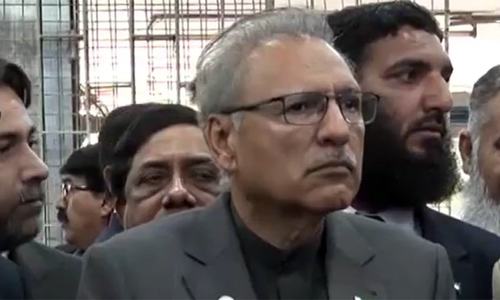
LAHORE: Punjab on Tuesday found two factors to blame for the national flour price crisis: supply and stocks bungling in Sindh and the role of Pakistan Flour Mills Association (PFMA).
Three provincial ministers – Samiullah Chaudhry (food), Mian Aslam Iqbal (industries) and Fayyazul Hassan Chohan (information) – held a joint press conference to explain the role of both these factors in the spiraling prices of the staple.
Denying any supply issue in Punjab, Mr Chohan claimed that the trouble was restricted to Sindh and the spillover effects are disturbing the other federating units.
“Their own stocks were pilferaged: in Dadu district, 184,000 bags went missing out of the total stock of 194,000. When reports surfaced, the federal government arranged 400,000 tons of wheat from the Pakistan Agriculture Storage and Services (Passco) stocks. But, Sindh lifted only 25 per cent of it. Both these factors came after the fact that Sindh had not procured any wheat this year. All three factors created a crisis in Sindh and put stress on the national supply chain,” he said.
“Punjab is completely comfortable, in stocks and supplies; it is rather helping KP with 5,000 ton and it is ready to supply to Sindh as well if need be. After rigging their own stocks and supply, the Sindh government is trying to deflect the blame on Punjab, which we don’t accept,” he said emphatically.
Three ministers go to the lengths to explain govt efforts to tackle situation
Explaining it further, Samiullah Chaudhry claimed that Punjab was completely comfortable. “It had a carryover stock of 1.4 million ton and added another 3.3 million ton to the tally last May. It was more than sufficient. It still has 2.3 million ton in its coffer when fresh crop arrival is only three months away. Another proof of comfort is that flour sale on the official points (482 sales and 207 trucking points) is only 72 per cent; 28 per cent flour is returning to it origin.
“The so-called crisis is the handiwork of a mafia which the PTI government is determined to fight,” he assured.
Dilating on the mafia claim, Minister for Industries Mian Aslam Iqbal who also heads the provincial price committee, said the PFMA was behind the artificial price crisis. “In fact, this mafia got offended when the government refused to toe its line on Ramzan package for this year. It wanted an elaborate package like those offered in the yesteryears. During last Ramzan, Punjab paid Rs9.378 billion on different subsidies to the mafia. This year, we refused and carefully brought the subsidy down to Rs2.33 billion and ensured supplies through efficiency and robust monitoring.
“The monitoring regime set during Ramzan continued and we found out later that certain millers were involved in other malpractices as well. Instead of 20kg packing, they started 15kg packing and were selling it as 20kg. Instead of 60pc flour, 24 per cent fine flour and 16 per cent choker as allowed, they doubled the amount of fine flour and sold it at exorbitant prices. On top of it all, they were leaving 16 per cent moisture in flour meaning thereby almost eight kilogram flour and two kilogram water. All these malpractices were stopped. This offended them and the result is this artificial crisis. But the monitoring would continue and made more stringent,” he emphasised.
Agreeing to the pricing crisis at the local grinding mills (chakki), he said the government would start supplying subsidised wheat (five bags a day to each of 900 registered ones) and had fixed a rate of Rs45 per kg for Lahore and Faisalabad and Rs42 for Multan.
“Overall supplies have also been increased to over 25,000 ton a day from earlier 22,000 ton. Both these factors should now flood the market and ease whatever pressure this propaganda has created. Similarly, the government is also alive to the sugar prices and continue monitoring these as well,” he concluded.
Published in Dawn, January 22nd, 2020














































